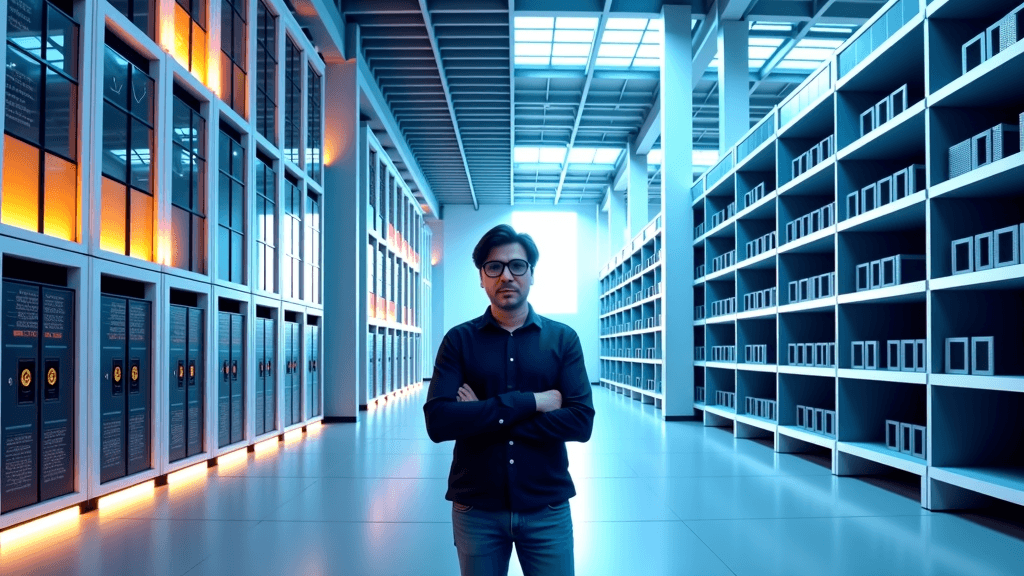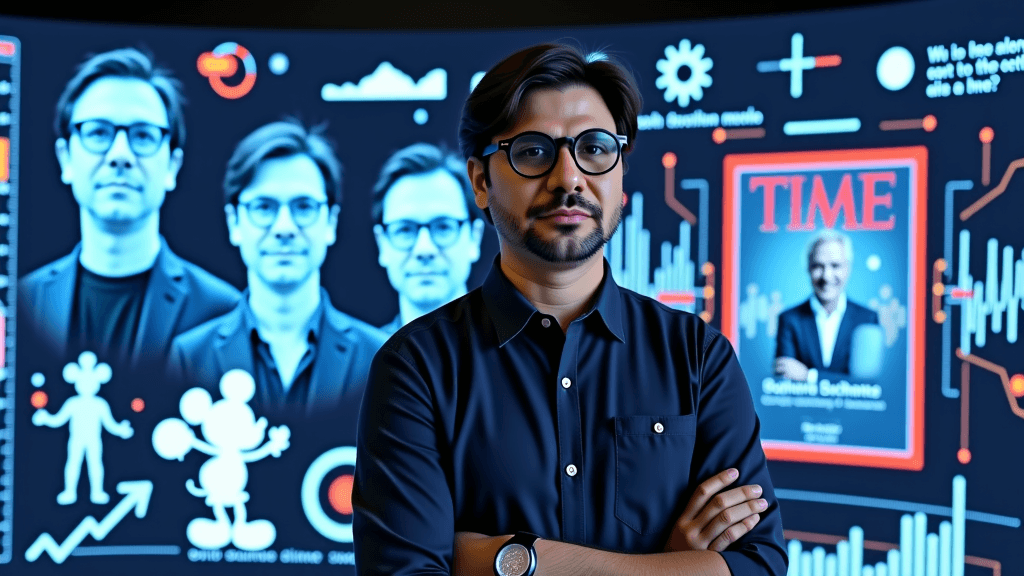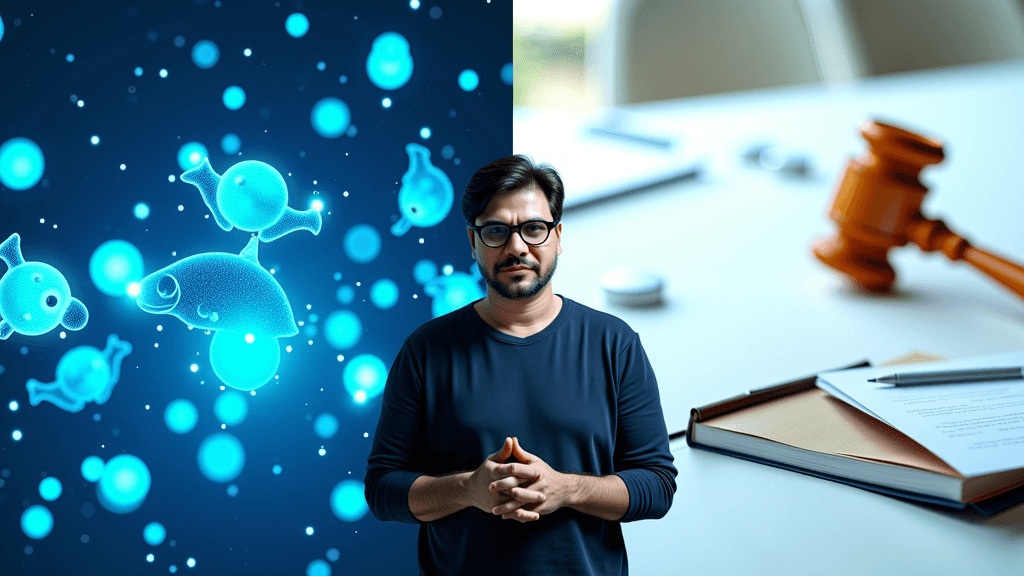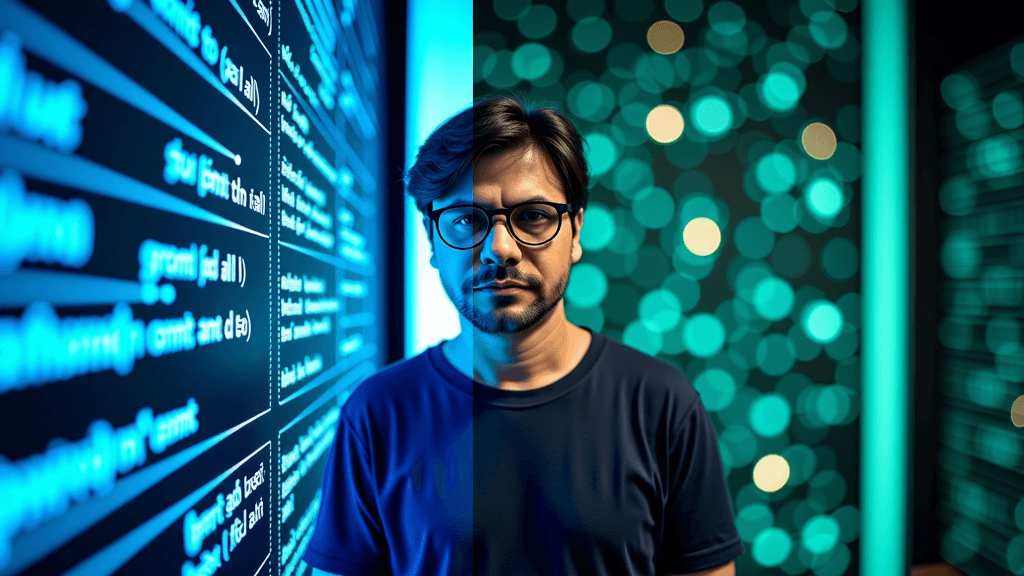All blog posts
Insights on startups, AI, innovation, the future of work and technology education. Practical strategies for impact businesses and digital transformation.
O Brasil acaba de entrar em um momento particularmente silencioso — e justamente por isso, revelador — da sua trajetória em inteligência artificial.
Enquanto os holofotes globais seguem fixados nas megabilionárias rodadas de investimento e nas disputas geopolíticas entre EUA e China, as últimas 24 horas nos entregaram algo que vale mais do que todos os anúncios vistosos somados: aplicações reais, brasileiras, democratizadoras e com impacto direto na vida das pessoas.
Não estamos falando de promessas. Estamos falando de tecnologia rodando, salvando vidas, abrindo portas de carreira e posicionando o Brasil como um player relevante — não apenas consumidor, mas criador de soluções de IA que resolvem problemas reais.
E existe um fio condutor costurando essas histórias: a inteligência artificial finalmente sendo usada com propósito, longe do sensacionalismo, perto da inclusão.
Uma Startup Brasileira Treinou uma IA Para Identificar Câncer Apenas Pelo Hemograma — E o Impacto Pode Ser Gigantesco
Vamos começar pela notícia que mais me impactou nas últimas 24 horas.
THE Huna, uma startup brasileira, desenvolveu uma inteligência artificial capaz de identificar indícios precoces de câncer de intestino utilizando apenas um exame de sangue comum — o hemograma. De acordo com UOL report, a CTO da Huna, Daniella Castro, explicou que o método se baseia em treinar a inteligência artificial para comparar hemogramas de dois grupos: pessoas sem câncer versus pessoas com lesões precursoras ou tumores já instalados.
A IA identifica padrões sutis de alteração que podem anteceder a doença — aqueles sinais que, para o olhar humano não treinado (e às vezes até para o treinado), passam despercebidos em meio aos números de um exame rotineiro.
E aqui mora a revolução.
O foco inicial da Huna foi o câncer de mama, mas a pesquisa evoluiu para o câncer de intestino, e a abordagem pode ser replicada para rastrear outras doenças complexas, como diabetes e falência renal. Mais importante: a Huna almeja levar essa tecnologia ao Sistema Único de Saúde (SUS), onde o impacto na redução de desigualdade no diagnóstico precoce seria imenso.
Os cálculos da empresa sugerem que, se implementada no SUS, a adoção desta tecnologia poderia reduzir em até 30% as mortes por câncer de mama no Brasil.
Trinta por cento. Deixa isso pousar um instante.
Não é uma melhoria incremental. É uma mudança de patamar civilizatório. Estamos falando de milhares de vidas salvas, de famílias inteiras poupadas do inimaginável, de um país que historicamente convive com a desigualdade no acesso à saúde finalmente usando tecnologia para fechar essa lacuna.
Por Que Isso Importa Mais do Que Qualquer Superinteligência Artificial de US$ 10 Trilhões
Eu trabalho com IA há anos, ajudando empresas, governos e startups a entenderem e aplicarem a tecnologia de forma estratégica e responsável. E posso dizer com segurança: o valor de uma IA não está no tamanho do modelo ou no volume de parâmetros. O valor está no problema que ela resolve e nas pessoas cujas vidas ela muda.
A Huna representa exatamente isso. Uma aplicação específica, focada, treinada em um dataset relevante (hemogramas brasileiros, contexto brasileiro), resolvendo um problema urgente de saúde pública, com viabilidade econômica e potencial de escala dentro do nosso sistema de saúde.
Enquanto os debates globais se arrastam em torno de projeções apocalípticas ou utópicas, a Huna está salvando vidas agora. E essa diferença entre discurso e ação define o momento de maturidade que vivemos.
SENAI e Google Lançam Plataforma Gratuita de IA Para Orientação de Carreira — e Democratizam o Acesso à Mentoria Profissional
A segunda notícia que merece toda a nossa atenção é igualmente transformadora, mas em outro espectro: empregabilidade e desenvolvimento de carreira.
THE SENAI, em parceria com o Google Cloud, lançou uma plataforma gratuita de inteligência artificial chamada Nai, acessível em nai.senai.br. According to G1 report, a ferramenta analisa currículos e experiências do usuário para identificar lacunas de qualificação e recomendar capacitações alinhadas às demandas do mercado de trabalho, correlacionando competências individuais com vagas disponíveis (integrando inclusive o Google Jobs).
O projeto faz parte de um convênio de cinco anos firmado em 2023, e funcionalidades futuras incluirão orientação na elaboração de currículos e mentoria online.
Como destacou Luiz Eduardo Leão, gerente do SENAI, em report from Valor Econômico, a IA visa a democratização do acesso a orientações de carreira, atendendo quem não pode pagar por mentoria humana — que, convenhamos, custa caro e é privilégio de poucos.
IA Como Ferramenta de Inclusão, Não de Exclusão
Eu sempre defendi que a IA deveria ser uma ferramenta de ampliação de capacidades humanas, não de substituição. E a plataforma Nai é um exemplo perfeito dessa visão.
Quantas pessoas no Brasil têm acesso a um mentor de carreira? Quantas conseguem pagar por consultorias especializadas para entender onde estão as lacunas de suas competências e quais cursos realmente fazem sentido para seu desenvolvimento profissional?
A resposta é: pouquíssimas.
Agora, imagine democratizar isso. Imagine que qualquer pessoa, em qualquer canto do país, com acesso a um computador ou celular, possa receber uma análise objetiva do seu perfil, entender onde precisa crescer, ter acesso a recomendações de capacitação de qualidade e ainda visualizar vagas compatíveis com suas competências atuais e futuras.
Isso não é futurismo. Isso está rodando, agora, de graça.
Claro, especialistas alertam — e com razão — para os riscos de vieses da IA e para a dificuldade de captar fatores subjetivos de carreira (aspirações pessoais, valores, contexto de vida). Mas é justamente por isso que a IA precisa ser supervisionada, iterada, melhorada continuamente. O primeiro passo sempre é imperfeito. O importante é dar o passo.
In my mentoring work with executives and companies, I always reinforce this: a IA não vai tomar decisões por você, mas vai te dar dados melhores para você decidir. E isso vale para carreira também.
O Contexto Global: EUA Disputam Talentos em IA Enquanto Brasil Capacita em Escala
Enquanto o Brasil lança uma plataforma gratuita para democratizar orientação de carreira, os Estados Unidos estão enfrentando uma guerra acirrada por talentos em IA — e o governo Trump decidiu entrar na briga.
According to CNN Brazil report, a administração Trump lançou a “Força Tecnológica dos EUA” (US Tech Force), um programa para recrutar 1.000 jovens profissionais em áreas como IA, segurança cibernética e análise de dados. O programa oferece contratos de dois anos, com salários competitivos (entre US$ 130 mil e US$ 195 mil anuais), e conta com parceria de gigantes como Microsoft, Adobe, Amazon, Meta, Apple, Google, NVIDIA e OpenAI.
O modelo é inteligente: as empresas colaboram oferecendo mentoria e se comprometem a considerar ex-membros do programa para vagas futuras, criando um pipeline de talentos que transita entre setor público e privado.
E aqui está o contraste interessante: enquanto os EUA disputam talentos com salários de seis dígitos, o Brasil está formando talentos em escala, de forma gratuita e inclusiva. Não são estratégias excludentes — são complementares. Mas dizem muito sobre prioridades e modelos de desenvolvimento.
Qual é o Nosso Papel Nessa Disputa Global?
O Brasil não vai competir dólar por dólar com Silicon Valley. Não faz sentido. Mas pode — e deve — competir em volume de talentos bem formados, diversidade de origens e aplicação criativa de IA para resolver problemas locais.
E é exatamente isso que começa a acontecer.
A parceria SENAI-Google, somada a iniciativas como a Huna, mostra que estamos saindo da fase de consumidores passivos de tecnologia para criadores ativos de soluções. E isso é estratégico. Porque quem domina a aplicação da IA domina o futuro das indústrias, dos serviços, da economia.
Governança de IA no Direito: O Risco do “Shadow AI” e a Urgência de Diretrizes Claras
Nem tudo são flores, e as últimas 24 horas também trouxeram um alerta importante.
According to artigo publicado no ConJur, o setor jurídico brasileiro está enfrentando o fenômeno do “Shadow AI” — o uso não supervisionado de ferramentas de IA generativa (ChatGPT, Claude, Gemini) por profissionais sem governança institucional.
Um levantamento do CNJ/PNUD de 2024 revelou que 45% dos tribunais brasileiros já utilizam IA generativa, mas em 57,6% dos casos o acesso é feito por contas pessoais, e apenas 5,9% dos órgãos possuem diretrizes claras sobre o uso da tecnologia.
Os riscos são múltiplos: vieses algorítmicos, erros factuais (as famosas alucinações), vazamento de dados sigilosos e indefinição de responsabilidade civil quando algo dá errado.
A solução, segundo o artigo, passa por três eixos: educação, regulação (como a Resolução 615/2025 do CNJ) e infraestrutura para sistemas auditáveis.
Por Que a Supervisão Humana Não É Suficiente
Um ponto crítico levantado pelo artigo é que a eficácia da supervisão humana é limitada — muitas vezes falha, e pode até gerar excesso de confiança na ferramenta.
Eu vejo isso diariamente no meu trabalho de consultoria. Executivos e profissionais altamente qualificados usando IA sem entender seus limites, tomando decisões baseadas em outputs que não foram validados, confiando cegamente porque “a IA disse”.
And therein lies the paradox: quanto mais poderosa a ferramenta, mais crítico precisa ser o usuário. A IA amplifica capacidades, mas também amplifica erros. E no Direito, onde cada palavra importa e cada decisão pode mudar vidas, o uso irresponsável de IA é perigosíssimo.
A governança não é burocracia desnecessária. É proteção. É responsabilidade. É ética aplicada.
Universidades Brasileiras Entre Transparência e Punição: O Desafio de Regulamentar IA Sem Criar Clima de Medo
As universidades brasileiras também estão se movimentando para regulamentar o uso de IA generativa por alunos, mas com abordagens bem diferentes.
Second report from Estadão, algumas instituições, como a UFPB, chegam a prever punições severas, incluindo a cassação de diploma em casos de uso fraudulento de IA. Outras, como Unicamp e PUC-PR, focam em orientações sobre transparência e preservação da autonomia docente.
Há também IES investindo em ferramentas de detecção de similaridade (UFMG, UFC), mas especialistas criticam essa abordagem, alegando que gera um ambiente de medo e que as ferramentas de detecção não são confiáveis — muitas vezes acusando trabalhos legítimos de serem gerados por IA.
O Falso Dilema Entre Proibir e Liberar
Eu não acredito que o caminho seja proibir ou liberar totalmente. O caminho é ensinar uso crítico e ético.
A IA está aqui para ficar. Fingir que ela não existe ou simplesmente proibir seu uso é negar a realidade do mercado de trabalho que esses alunos vão encontrar. Ao mesmo tempo, permitir uso indiscriminado sem reflexão crítica é jogar fora anos de desenvolvimento pedagógico.
O papel da universidade é formar pensadores, não operadores de prompt. E isso exige ensinar quando usar, como usar, quais os limites, quais as implicações éticas, como validar outputs, como citar fontes quando a IA for utilizada como ferramenta de apoio.
Nos meus cursos imersivos sobre IA, sempre reforço: a IA deve ser uma ferramenta de ampliação do seu pensamento, não um substituto para ele. Quem terceiriza o pensamento para a máquina perde a capacidade de pensar por si. E essa é a habilidade mais valiosa que existe.
IA Não Substitui Quem Pensa — Multiplica Quem Age
E já que falamos em substituição, vale resgatar um argumento importante que apareceu nas últimas 24 horas.
Second artigo publicado no GaúchaZH, a IA não substitui quem pensa, mas sim quem apenas repete tarefas padronizadas. A tecnologia funciona como um multiplicador de capacidade — similar à droga NZT do filme Sem Limites — liberando o potencial humano.
Dados da McKinsey indicam que até 60% das atividades atuais podem ser parcialmente automatizadas, mas o Fórum Econômico Mundial prevê que haverá mais criação de empregos do que perdas.
A implicação é clara: o diferencial não está em competir com a máquina em velocidade ou volume de processamento. Está em saber orientar a máquina criticamente, definindo o que é importante — habilidades que a IA não possui: propósito, ética, contexto social, julgamento humano.
O maior risco não é tecnológico. É comportamental: a resistência em aprender a ferramenta.
IA Como Ampliação, Não Substituição
Eu vivo isso todos os dias. Uso IA para acelerar pesquisas, estruturar conteúdos, testar hipóteses, simular cenários. Mas a decisão final, o contexto, a estratégia, o propósito — isso continua sendo meu.
E é exatamente essa combinação que gera valor. Não é o humano sozinho. Não é a IA sozinha. É o humano equipado com IA, perguntando as perguntas certas, validando criticamente os outputs, aplicando julgamento e responsabilidade.
Esse é o futuro do trabalho. E quem entender isso primeiro sai na frente.
Microsoft Projeta 7 Tendências de IA Para 2026 — e Uma Delas Pode Salvar 11 Milhões de Vidas
Fechando o panorama, vale destacar as projeções da Microsoft para 2026, publicadas em artigo do portal ABC do ABC.
Entre os sete destaques, dois chamam especial atenção:
- Ampliação Humana: Foco em agentes de IA como “colegas digitais”, não substitutos — reforçando tudo o que conversamos até aqui.
- Health: IA avançando para triagem e planejamento de tratamentos. O sistema Diagnostic Orchestrator (MAI-DxO) já alcançou 85,5% de precisão em diagnósticos, algo crucial considerando que a OMS projeta escassez de 11 milhões de profissionais de saúde até 2030.
E aqui o círculo se fecha: começamos falando da Huna detectando câncer por hemogramas no Brasil, e terminamos com a Microsoft projetando IA salvando vidas em escala global por falta de profissionais.
Não é coincidência. É convergência. A IA está se tornando infraestrutura crítica de saúde, não um acessório tecnológico.
O Que Essas 24 Horas Nos Ensinam Sobre Maturidade em IA
Se eu tivesse que resumir o que essas últimas 24 horas revelam sobre o momento brasileiro (e global) em inteligência artificial, diria o seguinte:
Saímos da era do hype e entramos na era da aplicação.
Não estamos mais falando de promessas abstratas de superinteligência ou de cenários apocalípticos de desemprego em massa. Estamos falando de uma startup brasileira salvando vidas com IA treinada em hemogramas. De uma plataforma gratuita democratizando orientação de carreira. De tribunais brasileiros enfrentando os desafios reais de governança. De universidades buscando o equilíbrio entre liberdade e responsabilidade.
Estamos, finalmente, amadurecendo.
E maturidade em tecnologia significa exatamente isso: menos discurso, mais prática. Menos sensacionalismo, mais responsabilidade. Menos promessas, mais entregas. Menos exclusão, mais democratização.
O Brasil Tem Tudo Para Ser Protagonista — Mas Precisa Agir
O que me deixa esperançoso é perceber que o Brasil não precisa competir em escala de investimento ou tamanho de modelos. Nosso diferencial está em três frentes:
- Diversidade: Nossa pluralidade cultural e social nos dá uma vantagem competitiva em entender contextos diversos e criar soluções inclusivas.
- Criatividade: Historicamente, o brasileiro sempre fez mais com menos. Aplicar IA em contextos de recursos limitados é uma habilidade que exportaremos para o mundo.
- Problemas Urgentes: Temos desafios sociais gigantescos (saúde pública, educação, desigualdade) que podem ser endereçados com IA — e essas soluções interessam a mercados emergentes globalmente.
Mas para transformar potencial em realidade, precisamos de três coisas:
- Investimento em capacitação em escala — e iniciativas como a do SENAI são um excelente começo.
- Governança clara e responsável — sem burocratizar, mas também sem deixar rolar solto.
- Fomento ao ecossistema de startups e pesquisa aplicada — casos como a Huna precisam se multiplicar.
O Que Você Pode Fazer a Partir de Agora
Se você chegou até aqui, provavelmente está se perguntando: “Tá, Felipe, entendi o contexto. Mas o que eu faço com isso?”
Algumas reflexões práticas:
If you are a professional: Pare de ter medo da IA e comece a aprender a usá-la criticamente. Invista tempo em entender ferramentas, limites, aplicações reais. Use plataformas como a Nai do SENAI para mapear suas lacunas e se desenvolver estrategicamente.
Se você é executivo ou empreendedor: Pare de esperar a IA “perfeita” e comece a testar aplicações específicas no seu contexto. Identifique um problema claro, busque uma solução focada, implemente com governança. No meu trabalho de mentoria, ajudo executivos e empresas a identificarem oportunidades reais de IA e desenharem estratégias de implementação responsável e escalável.
Se você trabalha no setor público: Demande (e apoie) políticas de capacitação, governança e fomento. Casos como SENAI-Google e Huna mostram que parcerias público-privadas funcionam quando bem estruturadas.
Se você é estudante ou está em transição de carreira: Aprenda IA, mas aprenda a pensar com IA, não apenas a operar ferramentas. Desenvolva pensamento crítico, ética aplicada, capacidade de validar informações. Essas habilidades vão te diferenciar em qualquer mercado.
Inteligência Artificial Com Propósito — É Disso Que o Brasil (e o Mundo) Precisa
Eu terminei dezenas de textos nos últimos meses alertando para riscos, apontando contradições, cobrando responsabilidade. E seguirei fazendo isso, porque é necessário.
Mas hoje eu quero terminar celebrando.
Celebrando a Huna, que está salvando vidas brasileiras com tecnologia brasileira. Celebrando o SENAI e o Google, que estão democratizando orientação de carreira para milhões. Celebrando os tribunais, universidades e empresas que estão enfrentando os desafios reais de governança em vez de fingir que eles não existem.
A inteligência artificial finalmente está cumprindo a promessa que sempre fez: ampliar capacidades humanas, democratizar acesso, resolver problemas reais.
E o Brasil, silenciosamente, está se posicionando como protagonista dessa história.
Não com os maiores orçamentos. Não com os modelos mais poderosos. Mas com as aplicações mais relevantes, inclusivas e transformadoras.
E isso, no final das contas, é o que realmente importa.
Se você quer entender como aplicar IA de forma estratégica e responsável na sua empresa ou carreira, entre em contato. No meu trabalho de consultoria e nos cursos imersivos que conduzo, ajudo organizações e profissionais a navegarem essa transformação com clareza, propósito e impacto real.
Porque a IA não é sobre tecnologia. É sobre o que fazemos com ela.










